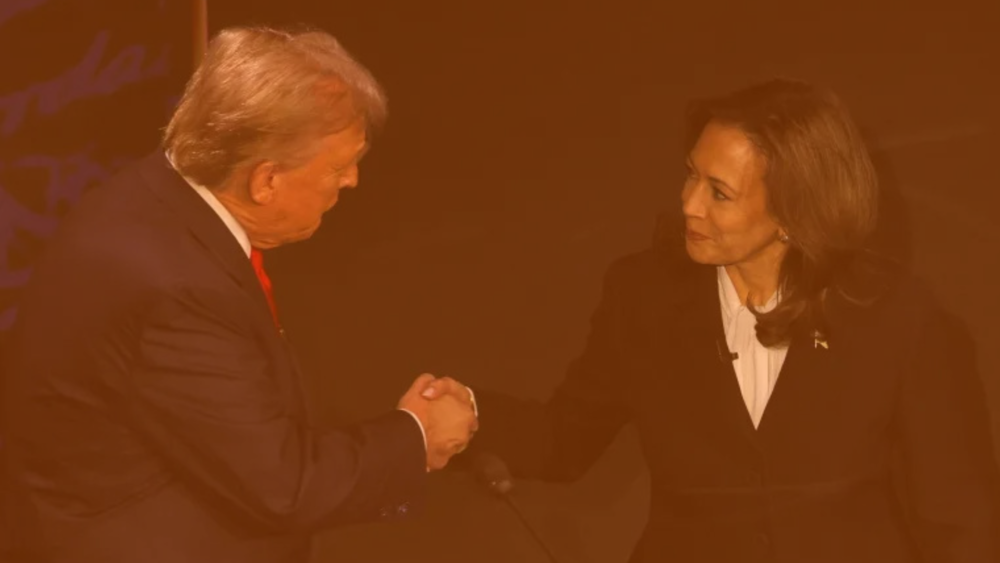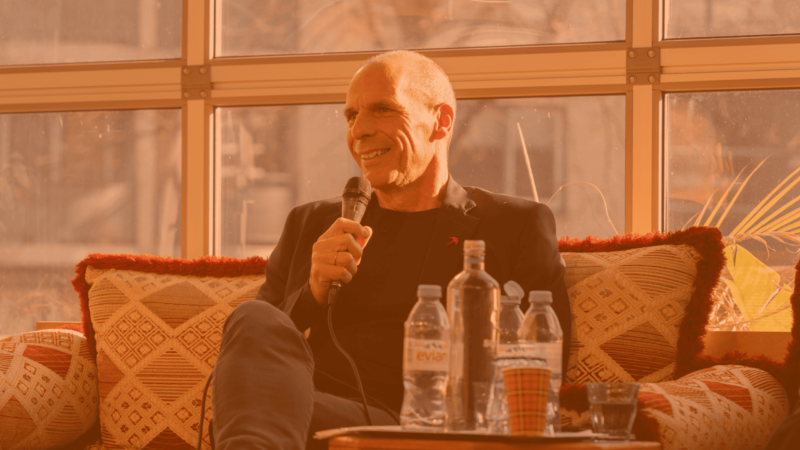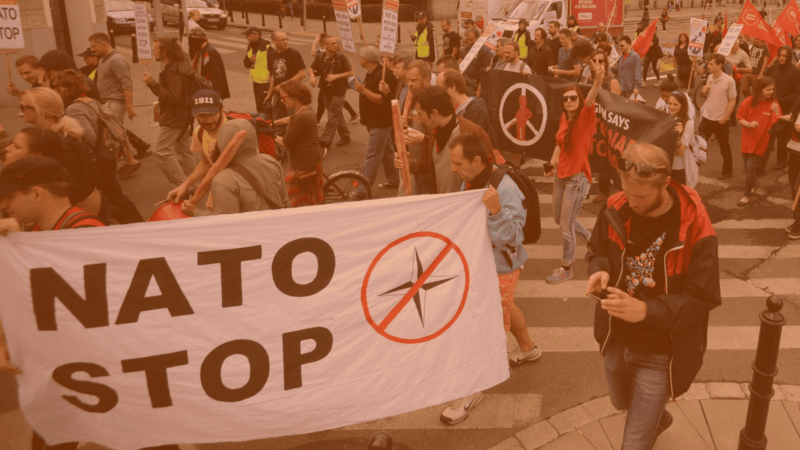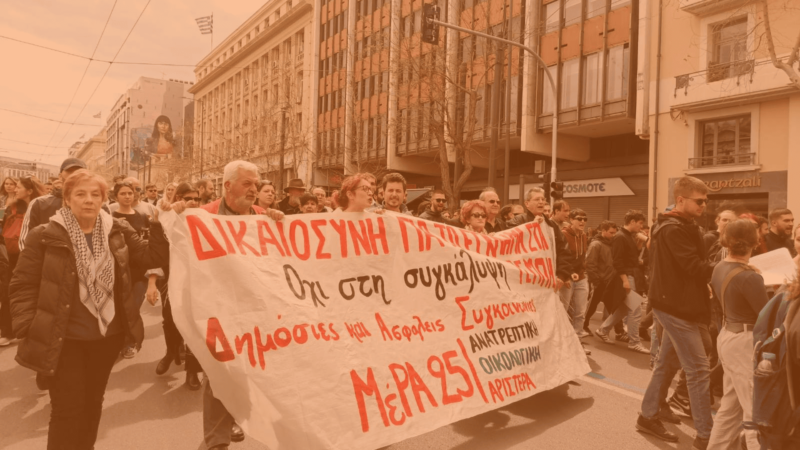The US presidential election is coming up, and current polls show the Democratic nominee, vice president Kamala Harris, and former president Donald Trump are virtually tied. Due to the fact that the unfortunate weight the United States continues to hold concerning conflicts across the globe, the consequences of this election will be felt far beyond its own borders.
For voters in the US, abortion, immigration and the post-COVID-19 economy are all cited as top concerns. But in this election, the absence of a Democratic primary like that of 2016 and 2020, which saw the popularity of the Bernie Sanders campaign able to push progressive policies to the forefront of mainstream political discourse, many on the Left are feeling increasingly disenfranchised. Issues like The Green New Deal and Medicare for All have largely disappeared from public debate. In the last few weeks of the campaign, Harris has shifted her focus away from working-class voters and instead sought to court the centre-right by campaigning with Liz Cheney, daughter of the Iraq war architect and war criminal, former vice president Dick Cheney, along with billionaires like Mark Cuban.
But another important issue that could prove decisive for voters this year is the ongoing US–backed Israeli genocide in Gaza. With massive student protests popping up last spring across college campuses, the role of the US in arming and supporting Israel in its siege on Gaza, alongside the ongoing occupation in the West Bank, has come under widespread scrutiny. Many on the Left have hoped to see Harris break from the Biden administration’s seemingly unconditional support for the Benjamin Netanyahu government, but Harris has shown no signs of a willingness to entertain any kind of arms embargo on Israel. According to Al Jazeera, on top of the $3.8 billion in military aid the US provides Israel annually, under Biden the US has delivered an additional $14 billion in support since last year. The Biden-Harris administration has also vetoed three ceasefire proposals from the United Nations Security Council.
The genocide in Gaza is shedding a new spotlight on how many in the US feel trapped by the country’s two-party system. Because of the US’ two-party duopoly, every election cycle sees voters forced to choose between two candidates more loyal to the oligarchs than average Americans. For too long, voters have felt their vote is a necessary compromise between the lesser of the two evils. It is a narrative vice president Harris has embraced throughout the campaign trail, often responding simply that Trump would be worse to any criticism or questions regarding her policies.
Trump has, in many ways, been a gift to the Democrats. As long as he is in the race, Democrats can use the existential threat he poses as an argument against any disagreement with their policies, saying the alternative would always be worse. But the genocide in Gaza has left many voters asking how, exactly, anything could be worse from the current Biden administration’s carte blanch approach to Israel’s attacks, which have now spread to Lebanon and Iran. By continuing to arm Israel, the US under Biden is complicit in what is happening, and Harris is intrinsically tied to his legacy.
Both the Democrats and Republicans are beholden to the country’s military-industrial complex. Barack Obama, the last Democrat to hold office, has been widely criticised for his unprecedented use of drones and the targeted assassinations in Yemen, Pakistan, Somalia, and Libya. While Trump claims the US was less engaged in international conflicts while he was president, Trump was responsible for violating international law with the attack that led to the assassination of Iranian general Qasem Soleimani as well as the dropping the ‘mother of all bombs’ in Afghanistan in 2017.
While Harris has vowed continued support for Ukraine in its conflict with Russia, many fear Trump would withdraw support from both Kyiv and NATO in general if elected. Trump and Harris have been equally hawkish concerning Iran, with Harris claiming Iran was the ‘greatest adversary’ of the US. But, before Israel’s military bombardment of Gaza, the common belief both at home and abroad was that Trump was still the more dangerous of the two candidates foreign policy-wise. He has been vocally supportive of the Netanyahu regime throughout the conflict, and his decision to break with decades of US policy by moving its embassy from Tel Aviv to Jerusalem created yet another barrier to any sort of two-state solution.
The move also led to an escalation of violence in Gaza where 60 Palestinians protesting the embassy’s opening in 2018 were killed on the border by Israeli forces and thousands of others were injured. Yet currently, as Israel has continued to cross red line after red line set out by the Biden administration and the loss of life in Gaza continues to reach unimaginable levels, some are questioning whether the choice between the two candidates is as stark as it once appeared. In the US, the disillusionment with Democrats brought on by the conflict has seen Green Party candidate Jill Stein gain popularity among progressive voters. Stein has attempted to separate herself from the two major parties by opposing the genocide and supporting an arms embargo against Israel. She also supports progressive policies like a 25-dollar minimum wage and a Green New Deal.
In Michigan, a state with a large Arab-American population and a key swing state in this election, the Uncommitted National Movement was formed by activists who might traditionally vote for the Democratic party but decided to withhold their vote until they saw a promise from the party that they would seriously work to stop the genocide in Gaza. Similarly, The Abandon Harris Campaign (formerly the Abandon Biden Campaign) is another grassroots coalition of progressive voices hoping to influence the Democratic Party into forcing an immediate ceasefire by withholding their support. Abandon Harris endorsed Stein in early October.
Michigan Representative Rashida Tlaib, the only American-Palestinian member of Congress, also released a statement that she too was withholding an endorsement of Harris until the vice president clearly said she would break with the Biden administration and stop arming Israel. Stein’s growing popularity has led to the Democrats releasing their first-ever ad campaign strictly targeting a third-party candidate. The ad paints Stein as a spoiler candidate and is a familiar strategy used by the Democrats to discount third-party alternatives. Stein stood in as the Green Party candidate in 2012 and 2016 and many blamed her for Hillary Clinton’s loss in 2016.
Still, those on the Left in the US and abroad who are hoping the Green Party’s growing popularity could symbolise some sort of grassroots, working-class movement taking hold in the country might find themselves disappointed. One of the main criticisms of the Greens is their lack of focus on organising at the local level and instead appearing every four years in high-profile presidential elections. As the Guardian reported recently, of the over half a million electoral offices up for election at any given time at the local and national level, the Greens hold only 149 posts. Importantly to note, the Green Party currently holds no seats in Congress. Stein has countered such criticisms, arguing that the Greens do have candidates on the ballot in a variety of races and that running candidates every four years in the presidential race is a necessity to keep their ballot access due to arbitrary rules the Democrats put in place trying to limit access for smaller parties.
Another argument for running candidates in presidential elections is that if the Greens can secure five per cent of the popular vote, they would have access to approximately $20 million in federal funding, which Stein says would be a game changer in the impact it would have in getting their message out to a larger base. The only other high-profile third-party candidate running on an anti-genocide, left-leaning platform is scholar and civil rights activist, Dr Cornel West. But his campaign has been fraught with party-jumping and a seeming lack of the understanding and organisation needed to navigate a complex electoral process. After first aligning himself with The People’s Party in early 2023, West later announced that he would stand instead as the Green Party’s nominee for president. Well-known and respected for his work on racial justice and his focus on fighting against systemic oppression, West’s alliance with the party looked to symbolise a new commitment by the Greens to prioritise issues of race and class in their agenda. But West decided to part ways with the Green Party as well, citing frustrations with the party’s bureaucratic nature and alluding to disagreements over the way it chose to discuss race in its platform. While West is still running as an independent candidate, his lack of any sort of party backing makes it difficult to know what potential his campaign has to foster a genuine challenge to the hegemony of the corporate duopoly that is US politics.
Regardless of their politics, the likelihood of a third-party candidate becoming president is often seen as an impossibility without a complete overhaul of the electoral process. Without abandoning the current first past the post system and a move to embrace a proportional representational model like ranked-choice voting (which is used in a handful of states), most concede the US is doomed to a binary election choice for the foreseeable future. But as Stein and many of her supporters argue, to see the election as a zero-sum game is playing into the Democrat’s narrative and effectively handing them the election without a fight. History shows us that while third parties may have trouble challenging the status quo by actually winning office, they have been successful in pushing for social reforms and forcing the mainstream parties to adopt more progressive stances. Something that, in the absence of a Democratic primary and the opportunity for a candidate to represent more progressive policies, as Sanders did in 2016 and 2020, feels more important than ever before.
Do you want to be informed of DiEM25's actions? Sign up here















